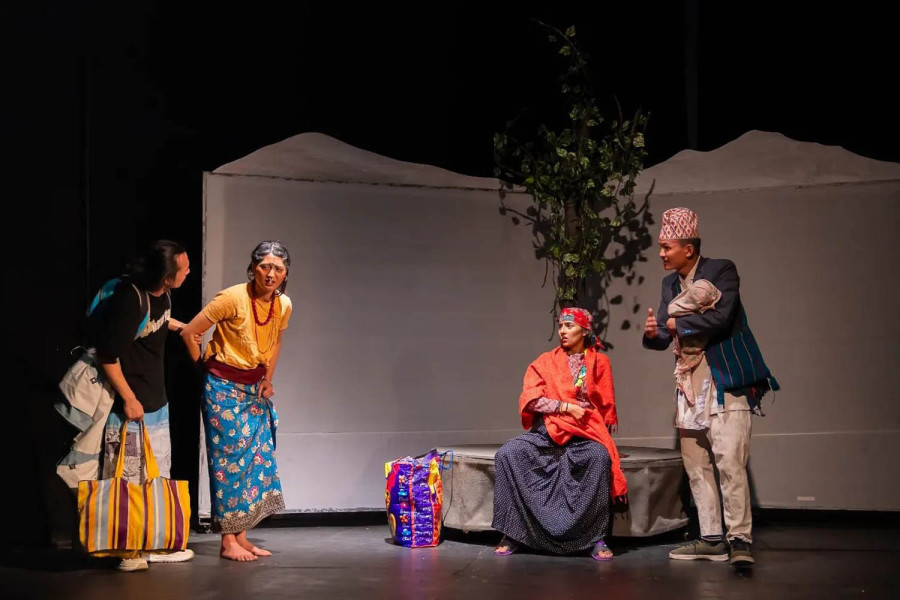Theater
Is the Nepali theatre scene short of playwrights?
Experts discuss the challenges and opportunities facing playwrights in Nepal’s theatre landscape.
Sanskriti Pokharel
The issue of whether Nepali theatre is facing a shortage of playwrights has emerged as a key topic in discussions about the current state of performing arts in Nepal. Back in the time when there was no proper space dedicated to theatre in Nepal, classical playwrights like Balakrishna Sama, Gopal Prasad Rimal, Bhimnidhi Tiwari, Vijaya Malla, and Govind Gothale worked hard to lay the foundation of modern drama and performance in Nepal.
With the presence of lonely resources, they ingeniously transformed schools and college halls into stages for their plays. Their commitment to Nepali theatre at the time enhanced the cultural scene and motivated a new generation of artists.
However, many contemporary practitioners are concerned about the diminishing number of original scripts and playwrights. Writers face financial difficulties, a lack of institutional backing, and limited creative opportunities, which prevent them from pursuing careers as playwrights and cast doubt on the future of Nepali theatre.
Pashupati Rai, a theatre artist and director, says, “Since the beginning of my journey in theatre, I have seen a limited number of people writing plays. At times, due to the scarcity of playwrights, there were only a few plays available, and I had no choice but to perform in those that were weak in terms of cohesiveness of words, word choices, and playwriting in general.”
She adds, “Dramas that are poorly written fail to justify the characters and become senseless. However, in a play with a well-crafted story and strong playwriting techniques, a character doesn’t have to shoulder all the challenges and conflicts of the plot alone.”
Just as students sharpen their skills amid intense competition, playwrights are motivated to improve their craft when immersed in a diverse and vibrant environment of creative works. This dynamic fuels creativity and encourages innovation, pushing the playwright to explore new themes, styles, and narratives. In such an atmosphere, the desire to stand out with audiences becomes a powerful catalyst for growth. Therefore, the number of individuals engaged in playwriting catalyses enhancing the art of storytelling in theatre.
Rai adds, “If much energy, time and dedication is not given to playwriting, it can negatively impact the characters and the whole drama.”
Aspiring playwrights often face financial hurdles when pursuing their craft. The key to overcoming financial constraints and cultivating a new generation of playwrights rests in individual initiative and creating a collaborative environment. By building networks among writers, directors, and actors, aspiring playwrights can share resources, ideas, and feedback for their development. This sense of community can help mitigate the financial and institutional barriers many face, allowing for a more vibrant exchange of creativity.
Abhi Subedi, a playwright and poet, opines, “Grappling with the needs of the craft is the aspiring Nepali playwright's problem. Studying, practice, and association are important requirements for confronting the challenges. They should study plays, become familiar with the nature of the craft, and, most importantly, develop an idea about the theatre. In other words, the playwright should aspire to stage the play they write. The playwright should maintain an association with theatres and maintain engagements.”
Spectacles and critics who meticulously observe theatrical scenes in Nepal may question why the Government needs to solve the issues with theatres. However, the reality is that governments do not cultivate playwrights nor actively support their endeavours. Why? “Because government and political parties have their dramas to manage. They are doing their theatres. Across the globe, there is a prevailing indifference towards playwriting from governmental bodies. However, when compelling plays emerge, and theatre practitioners struggle to find suitable venues or resources to stage them, it is the responsibility of the cultural departments within governments to step in and provide assistance,” says Subedi.
Financial support for theatre groups and performers is essential but needs to be improved in Nepal. The government often shifts responsibility to existing institutions for music and performance, claiming they don't have sufficient funds. This cycle of inaction leaves playwrights and theatre artists without the support necessary for their growth and success.
Playwriting is an inherently innovative and daring pursuit. However, more accessible alternatives are gaining traction, such as adapting plays from other cultures or languages like Hindi and English for performance. Subedi says, “While this practice can serve as valuable exercise or a means to introduce fresh ideas, relying on it as your primary focus means opting for a less demanding route. Instead, embrace the challenges of original playwriting.”
Forming collaborative groups to discuss your work, engaging with theatre academics for insights, and reaching out to relevant government agencies for support have the potential to benefit an aspiring playwright.
Subedi also advises aspiring playwrights to start writing, whether their initial plays are brilliant or rough around the edges. He believes in making one’s voice heard by performing in public spaces, such as streets and college halls, and invites journalists to attend, too. Their presence can help create a buzz around one’s work. Additionally, seeking out reputable individuals or organisations to publish plays helps greatly. This proactive approach can significantly enhance aspiring playwrights’ visibility, motivating them to pursue this as a career and thus increasing the number of playwrights in the country. Not to mention, it will foster a supportive atmosphere for their artistic growth, too.
On the other hand, Sunil Pokharel, a theatre artist and director, expressed strong opinions regarding the narrative that Nepal lacks playwrights. He dismissed the notion, asserting that Nepal’s theatrical scene does not lack anything. Pokharel said, “The theatre scene in Nepal is thriving, contrary to claims of scarcity. There is an increase in the number of productions and audience engagement.” Pokharel even mocked me for asking questions about the actions that can be taken to increase the number of playwrights. He said no actions are needed as the theatre scene is doing alright.




 18.35°C Kathmandu
18.35°C Kathmandu











